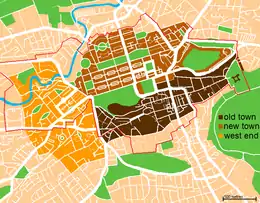Portobello, Edinburgh
Portobello is a coastal suburb of Edinburgh in eastern central Scotland. It lies 3 miles (5 km) east of the city centre, facing the Firth of Forth, between the suburbs of Joppa and Craigentinny. Although historically it was a town in its own right, it is officially a residential suburb of Edinburgh. The promenade fronts onto a wide sandy beach.
Portobello
| |
|---|---|
An aerial view of Portobello Beach | |
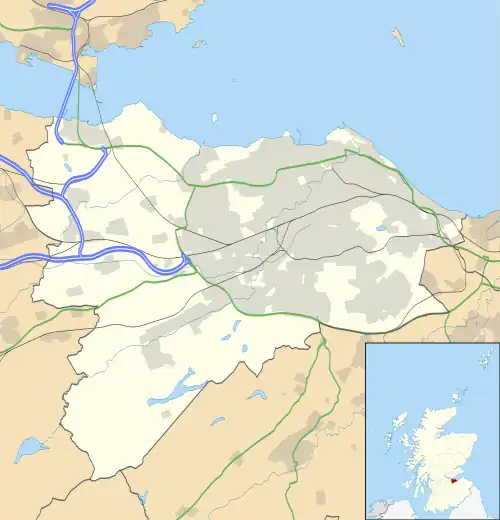 Portobello Location within the City of Edinburgh council area 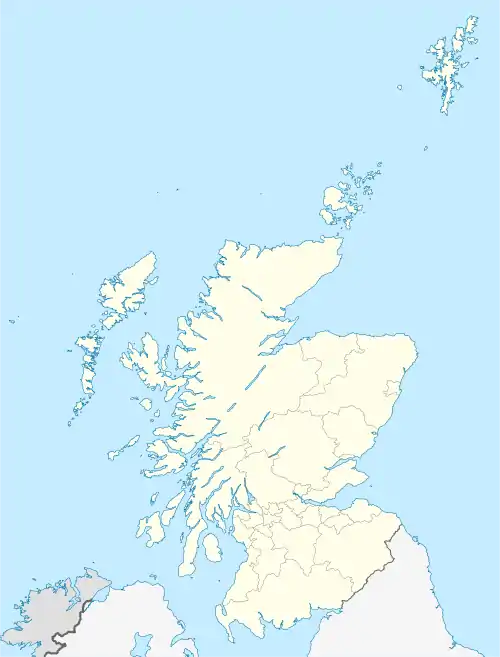 Portobello Location within Scotland | |
| OS grid reference | NT304738 |
| Council area | |
| Lieutenancy area | |
| Country | Scotland |
| Sovereign state | United Kingdom |
| Post town | EDINBURGH |
| Postcode district | EH15 |
| Dialling code | 0131 |
| Police | Scotland |
| Fire | Scottish |
| Ambulance | Scottish |
| UK Parliament | |
| Scottish Parliament | |
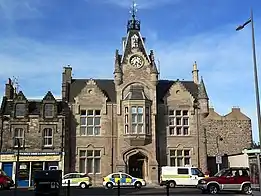

History
Early years
The area was originally known as Figgate Muir, an expanse of moorland through which the Figgate Burn flowed, from Duddingston Loch fed by the Braid Burn to the west, to the sea, with a broad sandy beach on the Firth of Forth. The name "Figgate" has been thought to come from an Old English term for "cow's ditch", but the land was used as pasture for cattle by the monks of Holyrood Abbey and the name is more likely to mean "cow road", as in Cowgate in Edinburgh.[1] In 1650 it was the supposed scene of a secret meeting between Oliver Cromwell and Scottish leaders. A report from 1661 describes a race in which twelve browster-wives ran from the Burn (recorded as the Thicket Burn) to the top of Arthur's Seat.[2]
1700s
By the 18th century the area had become a haunt of seamen and smugglers. A cottage was built in 1742 on what is now the High Street (close to the junction with Brighton Place) by a seaman called George Hamilton, who had served under Admiral Edward Vernon in the capture of Porto Bello, Panama, in 1739, and he named the cottage Portobello Hut in honour of the victory. By 1753 there were other houses around it. The cottage remained intact until 1851, when it became a hostelry for travellers known as the Shepherd's Ha.[2]
In 1763 the lands known as the Figgate Whins were sold by Lord Milton to Baron Mure for about £1,500. They were afterwards feued out by the latter to William Jameson or Jamieson at the rate of £3 per acre.[3] Jameson discovered a valuable bed of clay near the burn, and built a brick and tile works beside the stream. He later built an earthenware pottery factory, and the local population grew into a thriving village.[2] Land values subsequently rose, and by the beginning of the 19th century some parts had been sold at a yearly feu duty of £40 per annum per acre.[4]
An advertisement for bathing machines for hire on Portobello beach appeared in the Edinburgh Evening Courant of 11 June 1795, according to a report in the Evening Dispatch. It says the bathing machines have steady horses and careful drivers, and the bathing sands are perfectly free from stones and "danders", the water clear and the beach very retired.[5]
1800s
Portobello Sands were used at that time by the Edinburgh Light Horse for drill practice. Walter Scott was their quartermaster. While riding in a charge in 1802 he was kicked by a horse and confined to his lodgings for three days. While recovering he finished The Lay of the Last Minstrel.[2] The Scots Magazine in 1806 noted that the lands were "a perfect waste covered almost entirely with whins or furze". Portobello grew into a bathing resort, and in 1807 new salt-water baths at the foot of Bath Street and Regent Street were erected at a cost of £5,000.[4][3] In 1822, a visit of King George IV to Scotland organised by Scott included a review of troops and Highlanders held on the sands, with spectators crowding the dunes.[2]
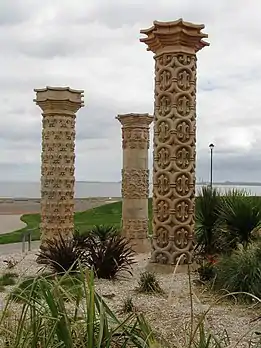
Before Portobello had a promenade and public beach, there was only a belt of dry sand between the firmer sand of the beach and the private properties adjoining the shore. Access to the beach was restricted by these property holders, as Sir William Rae discovered in 1842 when he tried to gain access to his favourite section for bathing. The proprietor of a villa adjoining the shore had extended his garden to include the sand and had built a wall leading right down to the sea. Sir William, a former Lord Advocate, viewed this as interfering with his right of way, as a private citizen and as an officer of the Crown. After legal action over several years and an appeal right up to the House of Lords,[6] the proprietor and his neighbours were forced in July 1849 to demolish the walls they had erected. Fifteen years later, Portobello Town Council began to build the Promenade, so securing public access to the beach along its two miles (three kilometres).[7]
Portobello became industrialized in the 19th century, manufacturing bricks ("Portobello brick"), glass, lead, paper, pottery, soap and mustard. Joppa to the east was important as a salt producer.
In 1833 the town was made a burgh, and jointly with Leith and Musselburgh, it was represented by one member of Parliament. Then in 1896 Portobello was incorporated into Edinburgh by Act of Parliament.[8] The Scotsman in 1912 noted that "It was by the provisions of the Edinburgh Extension Act of 1895 under which Portobello was amalgamated with the city, that Edinburgh gave an undertaking to build and maintain the town hall in Portobello, and in February of this year the Corporation decided to implement the bargain". A formidable red-brick power station was built in 1923 at the west end of the beach. It was extended by Ebenezer James MacRae) in 1938, and operated until 1977 when it was closed. It was demolished in the following 18 months.[9]
Between 1846 and 1964 a railway station provided access for visitors to the resort, whose facilities came to include a large open-air swimming pool, heated by waste from the power station. The actor Sean Connery once worked there as a lifeguard. The pool was closed in 1979. There was also a lido (now demolished) and a permanent funfair, which closed in 2007 and was also eventually demolished to make way for new housing.
1900s
Portobello Baths were constructed in 1898 and completed in 1901 on The Promenade overlooking the beach.[10] These, now known as Portobello Swim Centre, include one of only three remaining public Turkish baths in Scotland.[11]
Portobello Pier was a pleasure pier near the end of Bath Street, open from 23 May 1871 until the start of the First World War. At 1,250 feet (381 m) long with a restaurant and observatory at the end, it cost £7,000 to build to a design by Sir Thomas Bouch, who was infamously linked to the Tay Bridge disaster. The iron supports rusted away and the pier was demolished as uneconomic to repair in 1917.
The Edinburgh Marine Gardens laid out north of Kings Road in 1908–1909 included an open-air theatre, an industrial hall, a ballroom (later a skating rink), a scenic railway, a "rustic mill and water-wheel" and a speedway track. It fell out of use in the First World War and never recovered, although the speedway/motor cycle track remained in use until the outbreak of the Second World War in 1939. The site was cleared in 1966 for the Lothian Buses Marine bus depot.
The 1933 Portobello Lido received police and media attention with the July 1983 abduction of five-year-old Caroline Hogg from the Promenade area and her murder by Robert Black.[12]
Portobello's peak as a resort in the late 19th century gave way to slow decline through the 20th century. Whilst visitors were mainly from Edinburgh,[13] it was also once popular with Glaswegians, particularly as the Glasgow Fair "trade holiday" signalled the start of a two-week holiday for the west of Scotland.[14] By the 1960s, it had become an area of amusement arcades and permanent funfair attractions. From the 1980s these gradually disappeared, and by the end of the 20th century the Promenade had hardly any attractions specific to a seaside location, although the Tower Amusements arcade remains in business.
2000s
The 21st century has seen the emergence of community activities, some focused on the Promenade. The beach hosts regular beach volleyball, including Olympic beach-volleyball qualifiers,[15] and the annual Big Beach Busk event.[16] Other community activities focus more on the sea. They include the Portobello, Sailing, Kayaking and Rowing Club,[17] Rowporty,[18] and Eastern Amateur Coastal Rowing Club.[19] Others concern community gardens,[20] a monthly local food market,[21] a youth theatre (now using a new web address),[22] and culture and music.[23] Artistic activity has become popular, including the annual Art Walk Porty.[24] In April 2020 the Portobello Pencil Sharpening Project, thought to be an art installation, went viral on Twitter.[25]
In 2019 Portobello was voted the best neighbourhood in the UK at the 2020 Urbanism Awards.[26] In 2021 it was considered by a Sunday Times panel to be one of the top eight places to live in Scotland.[27]
The Scottish Environment Protection Agency (SEPA) classed the quality of the swimming water as "sufficient" in its 2019 survey, a small improvement on the previous year,[28] when dolphins were sighted off the coast.[29] In 2020 there was a sighting of what was thought to be a swordfish.[30] A wild swimmers' club has been braving the waves through the year since 2010.[31] Meanwhile, a warmer alternative is provided by the Turkish Baths in Portobello Swim Centre.[32]
In October 2016 Portobello became the first urban community in Scotland to register a Community Right to Buy after the 2016 expansion of Land reform in Scotland to cover urban areas.[33] Purchase of Bellfield Old Parish Church and Halls by Action Porty for £600,000 was confirmed by Scottish Government Ministers on 3 May 2017. The purchase was funded partly by the Scottish Land Fund and partly by community donations and borrowing.[34] The buildings and grounds formally passed from the Church of Scotland to Action Porty on 6 September 2017 and opened as Bellfield (Community Centre), Portobello on 23 June 2018.[35]
Work in 2019 on re-laying the paving setts in Brighton Place caused controversy over the cost and duration: the main road was closed to traffic until the end of 2019 while the work was done.[36][37] Ultimately, the new surface proved of high quality, including smooth sets for cycling and a refuge for safe turning into the Christian Path. The final cost of about £750,000 was less than predicted. Minor problems remaining with drainage were to be dealt with when the spring 2020 lockdown was lifted.
During the 2020 Coronavirus Lockdown, police praised the public for curbing the spread of the virus by avoiding Portobello over Easter weekend,[38] although as the weather improved in May the visitor numbers increased, causing concern to politicians.[39][40] Portobello continued busy over the summer of 2020, with some disturbances reported.[41] In August a Ferris wheel appeared on the old Fun City site, but its licence was suspended before it opened, as it broke government rules on the reopening of funfairs; despite this, some smaller attractions in the area have come and gone since.[42] Concerns about overcrowding on Portobello promenade continued into 2021.[43]
In September 2021, it was announced that the Swim Centre would shortly close for a £2.5 million refurbishment.[44]
Ethnicity
| Portobello compared | Portobello | Edinburgh |
|---|---|---|
| White | 92.6% | 91.7% |
| Asian | 4.8% | 5.5% |
| Black | 1.4% | 1.2% |
| Mixed | 0.7% | 0.9% |
| Other | 0.5% | 0.8% |
Transport
Buses
Portobello is served by Lothian Buses which provide eleven services to the area, continuing towards Joppa and Eastfield to Musselburgh, Port Seton, Tranent or North Berwick, down Brighton Place to Fort Kinnaird or Royal Infirmary, and from Kings Road to Craigentinny.[45] The former electric tramways operated by Edinburgh Corporation Transport Department were replaced by diesel buses in November 1956.
Railway
Portobello's first railway station was initially served by the Edinburgh and Dalkeith Railway. The Portobello (E&DR) railway station operated from 1832 until 1846, when it was replaced by the Portobello (NBR) railway station operated by the North British Railway. The station closed in 1964 under the Beeching cuts.
Hovercraft
For two weeks in 2007 there was an experimental hovercraft service to Kirkcaldy in Fife. Stagecoach was interested in running a regular service, but the local authority refused planning permission for the infrastructure.[46] Stagecoach planned to use a terminal to be built in Leith using public funds, which failed to materialise.[47]
Sport
The Promenade and beach host two annual four-mile (6.4-kilometre) running races: Portobello Beach Race every summer since 2013,[48] and the Promathom most New Year's Days since 1987.[49] A weekly five-kilometre (3 mi 188 yd) Park Run every Saturday in Figgate Park provoked press-reported controversy and exhibitionism in 2018.[50][51]
Town halls
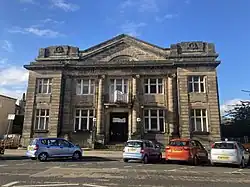
As an independent burgh, Portobello had aspirations for a town hall, the town council having first met in rooms in Brighton Place and then in Rosefield House. The first purpose-built hall (now the Baptist Church in the High Street) was designed by David Bryce and erected in 1862. This proved inadequate for the purpose and was replaced in 1877 by a building designed by Robert Paterson, which is now the Police Station.[52]
The Edinburgh Extension Act 1895, which amalgamated Portobello with Edinburgh, gave effect to a number of undertakings, including extension of the Promenade, building of the Baths, surfacing various streets, providing drainage, extending the trams, providing a public park and a new town hall for public meetings. The new Portobello Town Hall was intended to hold at least 800 people and was built on the site of Inverey House to a design by the City Architect, James A. Williamson, opening in 1914.[53][54]
In June 2019, the town hall was closed by the city council after the masonry and plasterwork were found to be in poor condition.[55] The city council put the building on the market for lease in February 2020,[56] and, following a competitive process, it agreed to enter into exclusive talks with a local community organisation known as Portobello Central in May 2021.[57][58] The city council confirmed, in June 2021, that it had allocated £350,000 of capital investment to the town hall project, money provided by the Scottish Government under its Place Based Investment Programme.[59] Portobello Central indicated that it hoped the funding would enable it to re-open the building by April 2022.[60] The Town Hall opened for business on 1 June 2023, under a 25-year, full repairing lease from the City of Edinburgh Council at £1 per year rent.[61]
Notable people
In birth order:
- Alexander Laing (1752–1823), architect based in Portobello, where he died
- The Misses Corbett, Grace (c. 1765/1770–1843) and Walterina (died 1837), poets and authors from Portobello
- Dr David Laing LLD (1792–1878), librarian to the Signet Library and noted archaeologist, lived at 12 James Street
- Mackintosh MacKay (1793–1873), compiler of a Gaelic dictionary and Moderator of the General Assembly of the Free Church of Scotland, died in Portobello
- Rear Admiral Thomas Fraser (1796–1870), hero of the First Anglo-Burmese War
- Hugh Miller (1802–1856), a founding father of geology, lived in the tower in Tower Street.
- Alan Stevenson (1806–1865), lighthouse engineer, lived his final years at 13 Pittville St, then called Pitt St[62]
- Stevenson Macadam (1829–1901), scientist and author, lived much of his life in East Brighton Crescent, Portobello
- William Durham FRSE (1834–1893), chemist, papermaker and astronomer, lived and died at 16 Straiton Place
- Lucy Bethia Walford, née Colquhoun (1845–1915), novelist, was born in Portobello
- James Graham Fairley (1846–1934) architect, lived at 47 Abercorn Terrace.
- Marion Grieve (1848–1938), suffragette, lived at Coillesdene House, Joppa
- William Ivison Macadam (1856–1902), chemist and antiquarian, spent his childhood in Portobello.
- Helen Hopekirk (1856–1945), composer, pianist and teacher, lived at 148 High Street, Portobello from 1856 to 1868 and is commemorated by a blue plaque[63]
- Alexander Philip (1858–1932), a lawyer born in Portobello, became a campaigner for calendar reform
- William Robertson (VC) (1865–1949), recipient of the Victoria Cross, lived at 21 Lee Crescent.[64]
- Harry Lauder (1870–1950), music hall entertainer, was born at 3 Bridge Street.[65] Although he and his family left the town within weeks of his birth, a Harry Lauder memorial garden was opened in 1970 in the grounds of the Town Hall built in 1912 and designed by architect James A Williamson.[66]) Portobello's main bypass is named Sir Harry Lauder Road.
- William Russell Flint (1880–1969), painter,[67] lived at 9 Rosefield Place.
- Alexander Heron (1884–1971), a member of 1921 British Mount Everest reconnaissance expedition and Director of the Geological Survey of India (1936–39), lived in Hamilton Terrace in 1900–1911.
- Madge Elder (1983-1985), born in Portobello, is a noted gardener and writer.
- Ned Barnie (1896–1983), born in Portobello, became in 1950 the first Scot to swim the English Channel.
- Norrie Haywood (1910–1979), born in Portobello, became a professional footballer and football manager.
- James Rankin (1913–1975), born in Portobello, was a RAF fighter pilot in the Second World War.
- Johnny Cunningham (1957–2003), Celtic fiddle virtuoso, was born in Portobello.
- Gail Porter (born 1971), TV presenter, grew up here, attending Portobello High School.[68][69]
- Ewen Bremner (born 1972), born in Portobello, is a noted film and TV actor.
- Iron Virgin (1970s), glam punk rock band [70]
- The Valves (1977), punk band from Portobello[71]
- Shauna Macdonald (born 1981), actress, grew up in Portobello.[72]
- Emun Elliott (born 1983) Actor [73]
Notable buildings
.jpg.webp)
Extant
Demolished
Portobello Parish Church
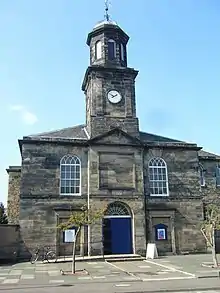
The building was designed by William Sibbald[74] and the foundation stone was laid on 27 October 1808 with the church opening for worship in 1810. It originally had the status of Chapel of Ease for Duddingston Parish Church to the west. In May 1834 the General Assembly of the Church of Scotland gave it the status of a quoad sacra church. It received full independent parish status in 1861.[75]
The church hall, built in 1964, stands on the former graveyard, but several stones survive, for instance in the narrow gap behind the back of the hall and the boundary.
In 2017 the church was sold by the Church of Scotland to the local community and reopened in 2018 as Bellfield community centre.[76][77][78]
See also
- For Portobello Cemetery, see Eastfield, Edinburgh.
- Portobello RFC
- Portobello Toddler Hut
References
- "Placenames of Midlothian" (PDF). Archived from the original (PDF) on 27 August 2011. Retrieved 6 July 2011.
- Grant, James (1880). "14: Portobello". Old and New Edinburgh. Vol. V. London: Cassell & Company Limited. pp. 143–149. Archived from the original on 9 December 2009. Retrieved 20 August 2009.
- Ordnance Gazetteer of Scotland: a survey of Scottish topography. statistical, biographical, and historical. New edition. Vol. V. London: William MacKenzie. p. 217.
- W. M. Gilbert, ed., Edinburgh in the Nineteenth Century, Edinburgh, 1901, p. 45.
- "Portobello's Rise to Fame". Evening Dispatch. 24 August 1950.
- Alexander Smith, W.S., Edinburgh v. The Right Hon. John Hamilton Dalrymple, Earl of Stair, and others, Her Majesty's Officers of State for Scotland, for Her Majesty's interest [1849] UKHL 6_Bell_487, 13 July 1849, archived from the original on 14 November 2017, retrieved 29 June 2019
- Catford, EF (24 August 1957). "The saving of the sands". Edinburgh Evening News.
- W. M. Gilbert, ed., Edinburgh in the Nineteenth Century, Edinburgh, 1901, p. 176.
- John Gifford, Colin McWilliam, David Walker and Christopher Wilson, eds, The Buildings of Scotland – Edinburgh, London, 1984, p. 650, ISBN 0-14-071068-X
- "In pictures: Edinburgh's Victorian swimming pools and where to find them". Edinburgh Evening News. Retrieved 28 December 2022.
- "VICTORIAN TURKISH BATHS". www.victorianturkishbath.org. Archived from the original on 5 May 2018. Retrieved 4 May 2018.
- McEwen, Alan (8 July 2013). "Caroline Hogg murder: City scarred 30 years on". The Scotsman. Archived from the original on 2 May 2018. Retrieved 2 May 2018.
- McCall, Chris (9 June 2016). "In pictures: Scots enjoy the seaside, now and then". The Scotsman. Edinburgh. Archived from the original on 20 August 2017. Retrieved 20 August 2017.
- Foley, Archie; Monroe, Margaret (6 September 2013). "Portobello & the Great War". Stroud: Amberley Publishing. ISBN 9781445611839. Archived from the original on 20 August 2017. Retrieved 20 August 2017.
- "Porty to host Olympic beach volleyball qualifiers". Archived from the original on 4 September 2018. Retrieved 4 September 2018.
- "Portobello Big Beach Busk hailed a huge success". Archived from the original on 4 September 2018. Retrieved 4 September 2018.
- "Portobello, Sailing, Kayaking and Rowing club". Archived from the original on 2 September 2018. Retrieved 4 September 2018.
- "Rowporty". Archived from the original on 4 September 2018. Retrieved 4 September 2018.
- "Eastern Amateur Coastal Rowing Club". Archived from the original on 4 September 2018. Retrieved 4 September 2018.
- "Donkeyfield Community Gardens". Archived from the original on 4 September 2018. Retrieved 4 September 2018.
- "Portobello Market". Archived from the original on 4 September 2018. Retrieved 4 September 2018.
- "Portobello Youth Theatre". Retrieved 4 September 2018.
- "Portobello Open Door (POD)". Archived from the original on 20 August 2018. Retrieved 4 September 2018.
- "'Humans of Porty' photo exhibition to tell local stories in Portobello". www.edinburghnews.scotsman.com. 4 September 2019. Retrieved 27 April 2020.
- "Mystery surrounds pencil sharpeners spotted around Portobello as social media post goes viral". www.edinburghnews.scotsman.com. Archived from the original on 29 April 2020. Retrieved 27 April 2020.
- "Portobello scoops top UK neighbourhood award". www.edinburghnews.scotsman.com. Archived from the original on 23 January 2020. Retrieved 30 November 2019.
- Walker, Peter A. (26 March 2021). "North Berwick named as best place to live in Scotland". businessInsider. Retrieved 28 March 2021.
- "Edinburgh beaches among 'dirtiest' in Scottish annual cleanliness report". www.edinburghnews.scotsman.com. Archived from the original on 19 June 2019. Retrieved 19 June 2019.
- "Pod of dolphins spotted off Portobello". Archived from the original on 29 August 2018. Retrieved 29 August 2018.
- "Incredible and rare video shows 'swordfish' swimming off Portobello coast". www.edinburghnews.scotsman.com. Retrieved 8 July 2020.
- "Swimming with the Wild Ones". Archived from the original on 4 September 2018. Retrieved 4 September 2018.
- "Take the plunge at Portobello's Turkish Baths". Archived from the original on 4 September 2018. Retrieved 4 September 2018.
- "Scotland's first urban right to buy". Archived from the original on 4 September 2018. Retrieved 4 September 2018.
- "Action Porty". Archived from the original on 4 September 2018. Retrieved 4 September 2018.
- "Right-to-buy community hub set to open in Portobello church". Archived from the original on 9 July 2018. Retrieved 4 September 2018.
- "Businesses fear for future as council plan to close Portobello road for a year". Archived from the original on 4 September 2018. Retrieved 4 June 2018.
- "Call for cobble work to be scrapped". BBC News. 4 June 2018. Archived from the original on 27 October 2018. Retrieved 4 June 2018.
- "Edinburgh police praise Portobello visitors over Easter weekend". www.edinburghnews.scotsman.com. Archived from the original on 20 April 2020. Retrieved 27 April 2020.
- "'This shows the dangers we face': Deputy First Minister criticises Portobello beach sunbathers". www.edinburghnews.scotsman.com. Retrieved 21 May 2020.
- "Nicola Sturgeon 'felt like crying' looking at Portobello sunbathing pictures". www.edinburghnews.scotsman.com. Archived from the original on 29 May 2020. Retrieved 22 May 2020.
- Galloway, Claire (8 August 2020). "Police cracking down on Edinburgh beaches this weekend after Portobello brawl". edinburghlive. Retrieved 9 August 2020.
- "'We just want to find a resolution to this': Council admits Ferris wheel license blunder". www.edinburghnews.scotsman.com. Retrieved 9 August 2020.
- "Police issue stay at home warning after large numbers gathered at popular outdoor spots". www.edinburghnews.scotsman.com. 24 January 2021. Retrieved 25 January 2021.
- Campbell, Jolene (3 September 2021). "Portobello's famous baths set to close for major revamp". Edinburgh Evening News.
- Bus map Retrieved 11 February 2018. Archived 12 February 2018 at the Wayback Machine
- Swanson, Ian (12 January 2017). "Calls for Forth hovercraft service following bridge closure". Edinburgh Evening News. Archived from the original on 1 May 2018. Retrieved 30 April 2018.
- Insider site Retrieved 2 May 2018. Archived 2 May 2018 at the Wayback Machine
- "Maureen Child Update 20 April 2017 – Portobello Online". porty.org.uk. Archived from the original on 26 August 2018. Retrieved 2 June 2018.
- "Portobello Promathon Results index". www.salroadrunningandcrosscountrymedalists.co.uk. Archived from the original on 26 August 2018. Retrieved 2 June 2018.
- "Portobello Parkrun under threat as athletes urinate in street". www.edinburghnews.scotsman.com. 4 January 2018. Retrieved 27 April 2020.
- "Porty parkrun turns nasty after competitive athletes "push child over"". The Scotsman. Archived from the original on 19 March 2018. Retrieved 2 June 2018.
- W. Baird, Annals of Duddingston and Portobello.
- The Scotsman, 23 October 1912.
- Historic Environment Scotland.
- "Portobello Town Hall future under threat as Edinburgh City Council unable to afford £1m repair bill". Edinburgh Evening News. 4 December 2019. Retrieved 17 September 2021.
- "Portobello Town Hall is up for rent - could you be the one to save this much-loved building?". Edinburgh Live. 4 February 2020. Retrieved 17 September 2021.
- "Edinburgh's Portobello Town Hall to be made 'beating heart' of community after local takeover". Edinburgh Evening News. 22 May 2021. Retrieved 17 September 2021.
- "The Portobello projects that show the power of community spirit". Edinburgh Live. 22 June 2021. Retrieved 17 September 2021.
- "Council awards funding for improvements all over Edinburgh". Edinburgh Reporter. 28 June 2021. Retrieved 17 September 2021.
- "Edinburgh locals rejoice as Portobello Town Hall is 'saved' by community buyout". Edinburgh Live. 20 May 2021. Retrieved 17 September 2021.
- Pearson, Geoff (Summer 2023). "Town Hall Reopens". Portobello Reporter. The Portobello Reporter Ltd. p. 1. Retrieved 6 August 2023.
- Portobello Post Office Directory 1865.
- "Helen HOPEKIRK (PageE100162.html)". www.hopkirk.org. Archived from the original on 19 January 2018. Retrieved 1 March 2020.
- Edinburgh and Leith Post Office Directory 1911.
- Lauder, Sir Harry, Roamin' in the Gloamin (autobiography) Hutchinson & Co., Ltd, London, 1928, p. 34.
- John Gifford, Colin McWilliam, David Walker and Christopher Wilson, eds, The Buildings of Scotland – Edinburgh, London, 1984, p. 653, ISBN 978-0300096729
- Stuff, Good. "William Russell Flint black plaque in Edinburgh". www.blueplaqueplaces.co.uk. Archived from the original on 1 December 2017. Retrieved 18 November 2017.
- Porter, G. (29 November 2007). "They told me I'd be crazy to go into TV". Irish Independent.
- "Porter's star turn at old school". BBC News website. 2 March 2007. Archived 15 March 2007 at the Wayback Machine, 2 March 2007.
- "Fame at last for 1970s group... but where are Iron Virgin?". The Scotsman. 18 December 2006. Retrieved 23 November 2020.
- McHugh, Stuart (17 March 2020). "No punk pressure - Gordon Scott on the return of The Valves". The Scotsman. Retrieved 23 November 2020.
- "Movie star Shauna rings in changes for Bellfield". Archived from the original on 17 June 2018. Retrieved 17 June 2018.
- ""There was blood up the walls ..." Emun Elliott on new BBC drama Trust Me". 5 August 2017.
- Wilson, Christopher; Gifford, John (1984). Edinburgh (Buildings of Scotland S.). Harmondsworth, GB New York: Penguin books. ISBN 014071068X.
- Fasti Ecclesiae Scoticanae; by Hew Scott
- "Church buyout wins 'crucial' funding". BBC News. 17 February 2017. Retrieved 14 April 2018.
- "Right-to-buy community hub set to open in Portobello church". Retrieved 2 June 2018.
- "Bellfield is back in business – Action Porty". www.bellfield.scot. Retrieved 9 July 2018.
